Kevin Lowry's Blog, page 6
October 2, 2013
You Want to Convert Me?
 I’m a grateful convert, but no one converted me.
I’m a grateful convert, but no one converted me.
You may have read about Pope Francis and his recent dialogue with atheist Eugenio Scalfari, founder of La Repubblica. In the published article, the Pope and Mr. Scalfari exchanged comments about whether they would attempt to convert one another. The Pope’s comments on the matter were decisive:
Proselytism is solemn nonsense, it makes no sense. We need to get to know each other, listen to each other and improve our knowledge of the world around us. Sometimes after a meeting I want to arrange another one because new ideas are born and I discover new needs. This is important: to get to know people, listen, expand the circle of ideas. The world is crisscrossed by roads that come closer together and move apart, but the important thing is that they lead towards the Good.
The Pope is unambiguous in his condemnation of proselytism (consistent with his predecessor), but at the same time doesn’t shy away for a moment from a constructive dialogue using a religious context and understanding. He does a masterful job of engaging an atheist friend in a way that is intrinsically evangelical. The key difference between the two approaches is simple – proselytism seeks to manipulate (think smarmy salesperson only interested in you as the potential source of a commission) while evangelization seeks to invite (think best friend in school offering to split his PB&J sandwich when you left your lunch at home). As I mentioned in a previous post, it’s the difference between having the truth, and the Truth having us.
Proselytism and evangelization are often confused, unfortunately, by people on both sides of the discussion. The Pope, thankfully, is not confused in the least. Consider his comments in the light of the Catechism (856):
The missionary task implies a respectful dialogue with those who do not yet accept the Gospel. Believers can profit from this dialogue by learning to appreciate better “those elements of truth and grace which are found among peoples, and which are, as it were, a secret presence of God.” They proclaim the Good News to those who do not know it, in order to consolidate, complete, and raise up the truth and the goodness that God has distributed among men and nations, and to purify them from error and evil “for the glory of God, the confusion of the demon, and the happiness of man.”
This brings us back to the beginning. If we’re honest with ourselves, and sufficiently humble, we can see that “converting someone” is above our pay grade. Certainly, we can engage in respectful dialogue, spirited debates, arguments even. But without love, we’re more of an impediment than a catalyst. 1 Corinthians 13, anyone?
My own conversion process took almost ten years, from the time I first went to Franciscan University as a 16 year old freshman (double majoring in beer and billiards, but that’s another story) to Easter Vigil over 20 years ago when I was baptized and blown away by a sacramental grand slam. It wasn’t the result of a person, it was the result of many people – but above all, the result of grace. Was it ever the result of proselytism? No.
Conversion is the work of the Holy Spirit. Our task is to love, to point towards the truth, and to express gratitude for God’s gift of the Church. I’m reminded of a line from a good friend of mine, Dan Burke. In his recent speech at my Legatus chapter entitled The Apologetics of Extraordinary Love, Dan emphasized:
Love is the bridge over which truth can pass.
That’s the way conversion works. Speaking the truth is great, but we need to do so in love, honoring the God-given freewill of our fellow man and seeking to evangelize, not proselytize. In the words of Jesus in John 13:34-35:
A new commandment I give to you, that you love one another; even as I have loved you, that you also love one another. By this all men will know that you are my disciples, if you have love for one another.
Even our Lord himself allowed people to walk away in John chapter 6 after he began talking about eating flesh and drinking blood. People thought he was nuts. But he honored their decisions, and let them leave. Did he love them, and desire their conversion? Of course! But confronted with the question “Do you want to convert me?” I wonder what Jesus might have said…
August 8, 2013
Stop Evangelizing Me!
 As a kid, it always bugged me when someone was a little too sure about the state of their eternal salvation – and mine.
As a kid, it always bugged me when someone was a little too sure about the state of their eternal salvation – and mine.
I heard things like, “You haven’t prayed in tongues yet? Be careful when you cross the street…” or “All you need to do is say a little prayer in your heart, and you’re saved!” One way was too hard, another too easy – and there were countless iterations in between. It didn’t make sense.
Over the course of time, these contradictions took their toll. After being smacked over the head with bibles (and dubious interpretations therefrom) too many times, I wanted to scream “Stop evangelizing me!”
It got worse.
In middle school, a classmate and I got into a pretty heated ongoing argument about the nature of salvation, and who was – and was not – going to heaven. His viewpoint was… well, let’s just say pretty exclusive. This festered for several months, and finally we brought in the big guns – our dads.
The four of us met at a restaurant to hash out our differences. I’ll never forget driving there in our beat up old station wagon, and the sinking feeling when my classmate and his dad parked next to us in a gleaming new Lincoln. As a Presbyterian minister, my dad was sadly disinclined to pour much family wealth into cars (in fact, he still suffers from this affliction).
As it turned out, we didn’t even make it through dinner. I’ll never forget my classmate’s dad – his condescending treatment of my father was nothing short of breathtaking. It was the kind of pontification one might expect from a shiny new Lincoln speaking to a crummy old station wagon, if cars could talk.
Never mind that this was a high school dropout lecturing a guy with a graduate degree in theology and Ph.D. from M.I.T. My classmate’s dad had the truth, and he let us know it in no uncertain terms. Presbyterians were going to hell. So were Methodists. Anglicans. Catholics. Pretty much everyone, it seemed, of a denomination other than my classmate and his dad.
Beyond the great example of my dad that day, who handled the situation with class and good manners in the face of truly boorish behavior, here are just a couple takeaways:
Evangelization isn’t about “being right” or “having the truth.” I don’t know that anyone has ever been effectively evangelized (at least into the Church, although probably out of it) by a jerk.
Humility is an absolute necessity. Jesus calls himself “meek and humble of heart” in Matthew 12:29, and we need to follow His example.
Actions really do speak louder than words. My classmate wasn’t known for treating others very well, and it hurt his credibility. Perhaps there was a genetic component to this disposition!
Honoring the freedom of others is really important. There is no true conversion without complete freedom. We can’t be manipulated, browbeaten, or shamed into faith – thanks be to God.
Only love leads to true change. Friendship, invitation, and constantly striving for holiness ourselves will always trump arrogance and argument. 1 Corinthians chapter 13 comes to mind.
Presumption about the state of our souls, or those of others, is a great way to turn people off. That judgment is above our pay grade. I am consoled by the Catechism of the Catholic Church (1037):
God predestines no one to go to hell; for this, a willful turning away from God (a mortal sin) is necessary, and persistence in it until the end. In the Eucharistic liturgy and in the daily prayers of her faithful, the Church implores the mercy of God, who does not want “any to perish, but all to come to repentance.” (2 Peter 3:9)
Thankfully, that means there’s hope for all of us. After all, is it more important that we have the truth, or that The Truth has us?
August 2, 2013
Conversion – Event or Process?
 As a child, I bounced around several Christian denominations, but made a conscious decision to live for Christ during my pre-teen years. In fact, I did this a few times, as there were countless opportunities to do so. In my travels, there were frequent altar calls and other invitations to accept Jesus as my Lord and Savior. In all sincerity, I made that choice in my heart.
As a child, I bounced around several Christian denominations, but made a conscious decision to live for Christ during my pre-teen years. In fact, I did this a few times, as there were countless opportunities to do so. In my travels, there were frequent altar calls and other invitations to accept Jesus as my Lord and Savior. In all sincerity, I made that choice in my heart.
Through the years, the invitations to accept Christ continued, since sermons were often focused on reaching the unchurched or nominal Christians. At one point a friend of mine went through a “rededication” ceremony. He had been a rebellious teenager, so when I inquired about this, he said it was exactly what it sounded like: he rededicated his life to Jesus, after repenting from his sins.
Around this time, my dad (who happened to be a Presbyterian minister), read a Catholic magazine called New Covenant. Through a seemingly random confluence of circumstances, this led to me enrolling at Franciscan University of Steubenville at age 16. This served to add a dimension to my thinking about the decision for Christ, since baptism was presented as a singularly important event.
Through my experiences at Franciscan (read that story here), I eventually experienced that event, being baptized at age 25 and entering the Catholic Church.
Conversion events are important. In a sense, they represent a new beginning.
I was born into a faithful Christian family, and in some sense my own conversion was inevitable. Dad was a Presbyterian minister, Mom was an enthusiastic minister’s wife who led bible studies and encouraged anyone facing troubles. Together, they were missionaries in Nigeria, loving parents, and to this day are terrific people. In what would prove to be a deeply ironic decision, they decided not to baptize me as an infant, so I could make the decision about faith for myself.
I decided to become Catholic. Within a year, they did too.
Since that time, I have pondered my first conversion event (the original decision for Christ) and process, which involves a new beginning every day, and lasts a lifetime. Let’s face it, although we may desire to live a Christian life upon an affirmative decision to accept Jesus as our savior, the decision itself does not necessarily confer a spontaneous ability to do so.
Every journey has a beginning, and it’s often the most difficult part. But how can we continue our journey, grow in our faith and come “further up and further in,” in the immortal words of C.S. Lewis? This applies not only to recent converts, but to all of us who have a need for continuous conversion, a desire to embrace our Christian faith more deeply through all of life’s circumstances.
We know it doesn’t always come easily. We have all heard stories, or know examples, of Christians whose growth in faith halted shortly after accepting Christ. Although these individuals might initially desire the gift of faith, their lives might be structurally opposed in some ways to Christianity. This is beautifully illustrated in the parable of the seed sprouting quickly but then withering in the scorching sun.
Converts, including those to Catholicism, bring their own set of challenges. Much like immigrants to a new country, it takes time to learn the language, become culturally aware, and grow sensitive to the nuances of the faith. The richness, depth, beauty, and history of Christianity in general, and Catholicism in particular, are vast, and we have varying abilities to assimilate into this new way of life and allow ourselves to be transformed.
In my personal experience, I’ve come to a greater appreciation for the events and the process. In a sense, conversion is a series of faithful, determined, and loving decisions to follow Jesus Christ with our entire lives. The foggy prayer first thing in the morning to offer our day to God. Biting one’s tongue rather than issuing a sharp reply to a colleague or family member. Being understanding rather than judgmental about a friend’s difficult situation. They’re all mini-events. And they’re all part of the process.
No matter who we are, growth in faith demands ongoing conversion, and that process is full of events. Each event, as good and sincere as it may be, is another beginning, a continuation of our growth in holiness. Authentic, ongoing conversion consists of both events and process – giving the gift of ourselves, our days and our lives, just as Jesus modeled for us.
So make that decision for Christ today, whether it’s an altar call, a sinner’s prayer, or going to confession. Our Lord will lead the process, directing all our paths to Him.
April 19, 2013
Catholic Mom’s Café
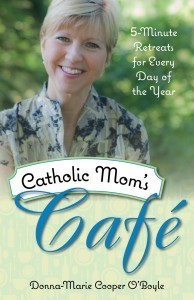 I admit it: I was a little reluctant about this book review. The problem is, I’m not a mom.
I admit it: I was a little reluctant about this book review. The problem is, I’m not a mom.
What can I possibly say about a book that targets mothers? It’s not like I have any experience with the subject matter. I’m a guy. So my experience is 100% vicarious. Actual experience, 0%.
When I received the review copy in the mail, I didn’t even open in for a couple days. It just felt daunting, like playing basketball wearing ice skates. But there was Donna-Marie’s smiling face on the cover. It’s impossible not to like her. Besides, she was so cool to me last year, when Faith at Work was released and I was just a newbie, know-nothing author. She sent me such encouraging notes, blogged about my book, and even mailed me a couple miraculous medals. So what’s a guy to do?
I started reading the book, and everything changed.
Immediately, I was absorbed. Yes, it’s a book from a mother’s perspective, and about motherhood. But there’s so much more to it! In short order, I realized that this book is just as applicable to men.
Why?
It’s a little hard to describe, but for you married guys, have you ever walked into the bedroom after your wife puts on your favorite perfume? It’s sort of similar – this book is distinctly feminine in a way that men will find alluring – and I suspect women will find encouraging.
Of course, I love retreats. They’re a spectacular way to slow down and gain a little perspective when the pace of daily life gains too much momentum. At the same time, at least in my own case, I feel the need for more one retreat per year. That’s why this book makes so much sense – there’s encouragement for every single day.
The practical approach of quotes, reflections and prayers are perfect for daily use. Have you ever read scripture and it just happens to be perfectly applicable to your current situation? I suspect you’ll often run into the same thing with this book. After all, we can never completely penetrate the depths of faith, hope and love, right?
If you’re not familiar with Donna-Marie, do yourself a favor and check out the blog dedicated to Catholic Mom’s Cafe (the book and the television series): http://catholicmomscafe.blogspot.com/ or follow its Facebook page: https://www.facebook.com/CatholicMomsCafe?ref=hl
Autographed copies of the book are available at www.donnacooperoboyle.com, Our Sunday Visitor, or the usual channels. Please consider purchasing a copy, you will be very glad you did!
March 29, 2013
More Must-Read Books
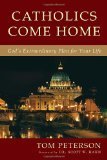
 Wow, am I ever behind on book reviews. Part of the problem is that so many good books have been released lately. In addition, I’ve been on the road a lot lately with speaking engagements (including a trip to Benedictine College this past week that was an absolute highlight.) So with apologies to the authors, here is a quick list of must-read books to consider for your reading list.
Wow, am I ever behind on book reviews. Part of the problem is that so many good books have been released lately. In addition, I’ve been on the road a lot lately with speaking engagements (including a trip to Benedictine College this past week that was an absolute highlight.) So with apologies to the authors, here is a quick list of must-read books to consider for your reading list.
Catholics Come Home: God’s Extraordinary Plan for Your Life is a tremendous place to begin. The author, Tom Peterson, is the entrepreneur extraordinaire who created the Catholics Come Home organization. Besides being a tremendous response to the call of the New Evangelization, the organization is credited with bringing hundreds of thousands of Catholics back to the Church through its innovative advertising campaigns in dioceses around the country and internationally. The book is outstanding, and does a great job telling Tom’s story and that of the organization. I admit to a bias, since Tom is a friend and Legatus brother, but you gotta check this one out.
is a tremendous place to begin. The author, Tom Peterson, is the entrepreneur extraordinaire who created the Catholics Come Home organization. Besides being a tremendous response to the call of the New Evangelization, the organization is credited with bringing hundreds of thousands of Catholics back to the Church through its innovative advertising campaigns in dioceses around the country and internationally. The book is outstanding, and does a great job telling Tom’s story and that of the organization. I admit to a bias, since Tom is a friend and Legatus brother, but you gotta check this one out.

 The next one is Choosing Joy: The Secret of Living a Fully Christian Life
The next one is Choosing Joy: The Secret of Living a Fully Christian Life by another friend, Dan Lord. Bias alert once again, I think Dan is a great writer and enjoy pretty much everything he does. You may recall that at one point I wrote a blog post called “Dan needs a job!” I am happy to report that he found one, as editor at CatholicExchange.com – perfect not only to benefit Dan and his family, but the rest of us as well. You may also know that Dan’s wife Hallie is an awesome writer too – she was the driving force behind last year’s hit Style, Sex, and Substance: 10 Catholic Women Consider the Things that Really Matter
by another friend, Dan Lord. Bias alert once again, I think Dan is a great writer and enjoy pretty much everything he does. You may recall that at one point I wrote a blog post called “Dan needs a job!” I am happy to report that he found one, as editor at CatholicExchange.com – perfect not only to benefit Dan and his family, but the rest of us as well. You may also know that Dan’s wife Hallie is an awesome writer too – she was the driving force behind last year’s hit Style, Sex, and Substance: 10 Catholic Women Consider the Things that Really Matter .
.
In Choosing Joy, Dan has hit a home run… unless of course, you’re among the small handful of people who would rather choose misery. I was particularly struck by his story about his dad, although I’ll avoid spilling the beans. It’s another one well worth reading, you can thank me later.
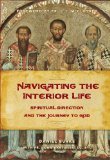
 Next, another Dan – this time Dan Burke, Executive Director of the National Catholic Register, Jewish convert and another Legatus brother and friend. Dan has hit a home run with his book Navigating the Interior Life: Spiritual Direction and the Journey to God
Next, another Dan – this time Dan Burke, Executive Director of the National Catholic Register, Jewish convert and another Legatus brother and friend. Dan has hit a home run with his book Navigating the Interior Life: Spiritual Direction and the Journey to God . I’m a huge fan of spiritual direction, and Dan gives us the step-by-step rationale and how-to approach that will benefit every serious Christian.
. I’m a huge fan of spiritual direction, and Dan gives us the step-by-step rationale and how-to approach that will benefit every serious Christian.
Dan was a guest on The Journey Home program late in 2011 (watch the show here) and is an extremely smart guy. He served previously as head of worldwide operations for Focus on the Family, and has done a terrific job with the Register, a faithful bi-weekly paper. The book helps encourage all of us, no matter where we are in our spiritual walk, to grow in our interior life and benefit from spiritual direction… it’s another must.
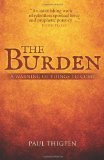
 In The Burden: A warning of things to come
In The Burden: A warning of things to come , my buddy and former colleague Paul Thigpen helps bring some of the dangers of our age into focus. This is Paul’s fortieth book, and let’s just say he doesn’t mess around – this isn’t a fluff piece. But if you want to be challenged, particularly to up your game in the midst of cultural turmoil, this is a timely way to set off the alarm. Paul is a brilliant individual, and this book is aimed at shaking the complacency out of all of us. However, it’s not a book without hope – as we know who is in charge, despite our best efforts to wrest the controls from God’s hands.
, my buddy and former colleague Paul Thigpen helps bring some of the dangers of our age into focus. This is Paul’s fortieth book, and let’s just say he doesn’t mess around – this isn’t a fluff piece. But if you want to be challenged, particularly to up your game in the midst of cultural turmoil, this is a timely way to set off the alarm. Paul is a brilliant individual, and this book is aimed at shaking the complacency out of all of us. However, it’s not a book without hope – as we know who is in charge, despite our best efforts to wrest the controls from God’s hands.
As a side note, Paul is one of the most gracious people I know – if you buy the book, it may have the “searing” effect Brian Gail speaks of in his endorsement, but you’ll have the sense that it’s for the best. Well worth it.

 Last, but certainly not least, is My Confirmation Book
Last, but certainly not least, is My Confirmation Book by Donna-Marie Cooper O’Boyle, another one of my favorite authors. Donna-Marie had a relationship with Blessed Teresa of Calcutta for ten years, and it’s obvious to me that some of the saintly nun’s holiness rubbed off. I was very touched when Donna-Marie sent me a miraculous medal a while back – I haven’t taken it off since.
by Donna-Marie Cooper O’Boyle, another one of my favorite authors. Donna-Marie had a relationship with Blessed Teresa of Calcutta for ten years, and it’s obvious to me that some of the saintly nun’s holiness rubbed off. I was very touched when Donna-Marie sent me a miraculous medal a while back – I haven’t taken it off since.
The books is a terrific gift for kids going through the confirmation process – in fact, I ordered a couple through Donna-Marie’s website for some very special young people who will remain nameless for the time being. For anyone who wants the perfect gift, or just to learn more about this under-appreciated sacrament, this is the book.
Particularly since writing Faith at Work, I’m more appreciative than ever just how much effort goes into not only writing, but promoting books in the Catholic press. Please consider supporting all these faithful authors, you will be thankful you did!
March 11, 2013
Baby Steps to Humility
 The other day, I was driving home from work and pulled up alongside a pickup truck at a red light. A woman was driving, accompanied by a couple guys in the cab. Nothing unusual, right?
The other day, I was driving home from work and pulled up alongside a pickup truck at a red light. A woman was driving, accompanied by a couple guys in the cab. Nothing unusual, right?
Moments later, the light turned green, and I gave my car a little extra gas, since I needed to make a left turn shortly down the road. Much to my surprise, the pickup gunned its engine and proceeded to keep up with me, threatening to subvert my handy little plan to make a left and head home to Columbus, rather than north to Cleveland.
In that brief instant, my shock at being in an impromptu drag race crystallized into a clear choice: should I accelerate further and make the pickup truck eat my dust, or back off?
By way of background, there is at least a hypothetical possibility that seeing a red light turning green unleashes a primal need deep within my being for quick acceleration and the ability to turn left if I darn well want to. Oh, there was a time not all that long ago when the possibility might have been slightly (just slightly) more than hypothetical. Prudent planning for my mid-life crisis, now in life’s rear view mirror, resulted in a couple Corvettes and an ’05 Pontiac GTO (with the 400 hp LS2 Corvette engine). They’re gone now, replaced by a doleful sense of fiscal responsibility and a dreadfully responsible sports sedan that seats five.
The dreadfully responsible sports sedan is no rocket ship, much to my chagrin, but I was pretty sure it could make rust flavored mincemeat of a Silverado. So there I was. On the one hand, an alleged propensity for trying to win life’s little red light battles, and on the other – a slight whisper about growing in an obscure virtue known as humility.
See, I’ve been working on becoming more humble. If I told you that I was fantastic at humility, you’d probably tell me it was time to start all over again, right? Well, there’s no need. Since becoming aware of the concept, I can honestly say that I have much to learn.
For anyone else who needs some help in this area, let’s begin with a good definition. Fr. John Hardon’s Modern Catholic Dictionary says humility is:
The moral virtue that keeps a person from reaching beyond himself. It is the virtue that restrains the unruly desire for personal greatness and leads people to an orderly love of themselves based on a true appreciation of their position with respect to God and their neighbors. Religious humility recognizes one’s total dependence on God; moral humility recognizes one’s creaturely equality with others. Yet humility is not only opposed to pride; it is also opposed to immoderate self-abjection, which would fail to recognize God’s gifts and use them according to his will.
So what does this look like in daily life? If you look around, examples of “unruly desire for personal greatness” seem to abound, no? An appreciation of our own position with respect to God and neighbors sounds like a similarly foreign concept.
Here’s just one, modest suggestion in order to build a pinch of humility into our day. It’s not even my idea. A very wise friend told me “If you want to grow in humility, perform acts of humility.” In other words, don’t just want it. Do it. Stupid. No, he didn’t really say that last part.
Given the fact that we are presented many times a day with an opportunity to pat ourselves on the back, take a swipe at someone else, or even give in to “immoderate self-abjection” (being overly hard on ourselves), perhaps one of the best things we can do to improve is to take baby steps. Yes, towards the goal of humility. The fact is, most of us can use a little development in this area.
Oh, it’s probably worth mentioning that God hasn’t been shy about proclaiming the importance of humility. It would be difficult to cite all the verses in scripture about the rewards for the humble of heart, the stories Jesus tells illustrating why humility is necessary to enter the Kingdom of Heaven, and the foundational nature of this virtue in our lives. So let’s resolve to be humble today. Take a baby step. Then take another.
You know the end of the story, right? I let the pickup win. It was just one more baby step along the path of humility.
Note: Many thanks to Catholic Exchange for originally posting this article in February 2013.
February 21, 2013
Something More: An Interview with Randy Hain

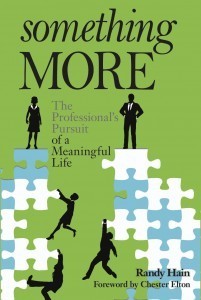 In a spirit of full disclosure, I am a Randy Hain fan. As a friend, he has been the source of unfailing encouragement, fellowship, and wisdom. Yet there are many dimensions to the man… Randy is a husband, father, writer, speaker, business leader, and much more. His third book, Something More: The Professional’s Pursuit of a Meaningful Life
In a spirit of full disclosure, I am a Randy Hain fan. As a friend, he has been the source of unfailing encouragement, fellowship, and wisdom. Yet there are many dimensions to the man… Randy is a husband, father, writer, speaker, business leader, and much more. His third book, Something More: The Professional’s Pursuit of a Meaningful Life is packed with insight and practical tips we all need to seek – and find – greater meaning in our professional work.
is packed with insight and practical tips we all need to seek – and find – greater meaning in our professional work.
I was able to catch up with Randy (no small feat, I assure you) to discuss the book, and our discussion follows. Enjoy!
Randy, this new book of yours is written for business professionals. What motivated you to write it?
I wanted this book to address what I have observed my 20+ years of conversations with candidates and business leaders: people are seeking more meaning out of life than simply their work. They often express it in different ways, but ultimately the majority of the people I meet are seeking more balance, more faith, more intellectual stimulation or more community involvement. Sometimes they simply want to make a living doing what they love! “Something More” captures the best of these experiences along with the interviews I conducted with professional men and women around the country on how they are pursuing a more meaningful life.
I sincerely hope that the book will provide a road map to those seeking direction and a way to get started towards a life that is richer and fuller when work is in its proper place.
I like that you are clearly Catholic in the book when you relate your story, but the people you interviewed come from a wide variety of faith backgrounds. Was that intentional?
Absolutely! People who read my first two books know me for my Catholic writing, but in my professional life as the head of a national recruiting firm I deal with people from all faith backgrounds. I wanted the book to be authentic and genuinely express the variety of opinions about faith which exist in the world.
I also had a strong desire to write a professional mainstream book which had a strong faith element woven into it. The workplace is often an alien place for faith to exist, but in the book I encourage people to lead integrated lives and not leave their faith at the door. The book also addresses a host of other topics in addition to faith as I mentioned earlier.
There is a raw and honest feel to the book and the stories of the people you interviewed really rang true. You don’t see many business books like this in today’s world. How do you think the book will be received?
Based on early feedback from several reviewers and conversations I have had with others, I believe the book will be very well received. People are starving for authenticity. They want to identify with people who have lived through the same challenges. The book is honest and deals with real problems people face. I also wrote four very challenging questions for self-reflection at the end of every chapter to encourage the reader to identify the lessons they learned and hopefully assimilate them into their lives.
Authenticity has been a recurring theme in all of your books. As a business person and Catholic author, how does that manifest itself in your daily life?
I appreciate that question and I have thought about the word authenticity a lot over the years. When I finally surrendered to Christ in the fall of 2005 and joined the Catholic Church in 2006, I set aside my old compartmentalized approach to life and work. I began the often difficult process of just being the same person all the time and living as integrated a life as possible with Christ at the center. The older I get the more committed I am to this authentic path and doing what I believe is right. The world fights us at every turn, but this is the path that we are supposed to walk if we wish to attain Heaven. I could certainly use your prayers!
You interviewed some fascinating people in connection with the book. Were there any surprises as you spoke with them, and did any particular stories resonate?
The interviews made the book come alive and what may surprise you is most of the people in the book came into my life or hit my radar in a random fashion. Very few of them were identified to be included before I began the project. I let it unfold naturally and prayed about it a great deal as I looked for people sincerely looking for meaning out of life than simply their work. The result was an honest representation of what I believe most of us experience and think in the course of our lives and the stories will hopefully resonate with everyone.
One of my favorite interviews was with Ellina Feldman in the chapter titled “The Role of Crisis.” This young woman has been through so many challenges in her life and yet she is one of the most determined and joyful people I have ever encountered. We could all learn a lot from her!
One of my favorite parts of the book was your discussion with our friend Andreas Widmer, author of The Pope and the CEO. In the context of your discussion regarding the nature of success, how would you define success in your own life at this point?
I appreciate this question and think about it often. I believe as I get older and more firmly rooted in my Catholic faith, the less I care about the world’s view of success. I place more value in raising my family, the quality of my friendships and the difference I can hopefully make in the community and for the Church. Above it all is my relationship with Christ and making sure He is the center of my life. I would describe a “successful” day as one where I have done my absolute best to serve Christ and His Church, my wife and children are thriving and the people I encountered that day felt I made a positive difference in their lives.
You are one of the busiest guys I know! What other projects are on the horizon after Something More: The Professional’s Pursuit of a Meaningful Life?
Do you mean after my long vacation? I truly love writing and have a few other projects I am considering including a book about being a Catholic dad for 2014 and an eBook project to help people in career transition. After that I will just have to see what else our Lord has in store for me!
Thank you so much, Randy! As a fellow traveler and seeker of a meaningful life, it is a privilege to enthusiastically recommend your book. I expect it will lead many people to strive for greater success, faithfulness – and purpose.
February 12, 2013
5 Reasons to Speak Positively about your Spouse at Work
 “Sorry, I can’t do it tonight. The old ball and chain gets ticked off if I’m out late.”
“Sorry, I can’t do it tonight. The old ball and chain gets ticked off if I’m out late.”
How many times have we heard derogatory comments like this about spouses in the workplace? Even worse, snide remarks can give way to all-out whining: “My husband is such a jerk sometimes” or “My wife completely lost interest in me after we began having kids.”
Sacramental marriage should be in a different league than this, but we all live in a culture that hasn’t done the greatest job honoring the institution. In reality, we also know that even the strongest sacramental marriages sometimes go through serious challenges.
So what’s a good Catholic spouse to do?
Well, brace yourself for some good news. There are things we can do to honor our spouses in the workplace, and not be swayed by the cultural winds that sometimes blow all around us. How about this one: always speak positively about your spouse at work. Why? Here are five reasons – and they just scratch the surface.
Complaining about your spouse lacks class. Oh, maybe it’s fashionable to gripe and assume an attitude of superiority over your spouse. But does that make it right, and does it really make you happy? Probably not. Besides, if your spouse is such an idiot, what does that say about you, the person who made sacred vows to him or her?
How you speak can become a self-fulfilling prophecy. Have you ever noticed how good spouses make each other winners, and bad spouses make each other losers? Words matter. Speaking with honor is part of acting with honor – even when your spouse isn’t around.
It protects your marriage. Even when things are rough at home, airing your grievances at work is the wrong venue. Co-workers who complain about their spouses open up an avenue for support from other co-workers, including those of the opposite sex. This can progress to inappropriate emotional intimacy, and worse.
It’s good for your career. Many of the virtues that make for a faithful spouse also make for a great employee or co-worker. Besides, getting in the habit of speaking positively about others (including your spouse) behind their backs helps build a better culture for everyone in your workplace.
It’s good for your co-workers. We are affected, for better or worse, by the attitudes and behaviors of our co-workers. Demonstrating charity and understanding towards our spouse might just inspire others to do the same.
We can’t single-handedly change the state of marriage in the world, but we can do our best to honor our own marriage vows – and our spouse. Speaking positively about our spouse in the workplace is a great way to improve our marriage, our workplace, and our walk with Christ.
Note: Thanks to The Integrated Catholic Life for originally publishing this post in February 2013.
February 6, 2013
Clement of Rome & the Didache
[image error]If a fulfilling career consists of working with terrific people, then I must have one of the greatest jobs on earth.
After twenty years in financial and executive roles, it has been my privilege since 2010 to work with The Coming Home Network International (CHNetwork), a Catholic apostolate that helps non-Catholic clergy and laity to come home, and be at home, in the Catholic Church. Many people recognize the organization’s founder, Marcus Grodi, through the popular EWTN show The Journey Home.
For the past year, we have also enjoyed having Dr. Kenneth Howell on our staff as Resident Theologian. Among Ken’s noteworthy achievements are his not one, but two earned doctorates. He is the author of seven books and has published dozens of articles in scholarly and popular journals. Ken taught for thirty years in seminaries and universities prior to joining the staff of CHNetwork on a full-time basis.
Ken has a particular interest in the Church Fathers, and a deep appreciation for their role in the conversion of hearts to Jesus Christ through the centuries. He recently published a new book entitled Clement of Rome & the Didache – A New Translation and Theological Commentary. It’s the second in his Early Christian Fathers series, following Ignatius of Antioch and Polycarp of Smyrna. I was fortunate enough to catch up with Ken recently to ask him about the book and what we can learn from Clement’s Letter to the Corinthians and the Didache. Our exchange follows.
Grateful Convert (GC) – Tell us a little about Clement of Rome. Who was he, and why are his writings important?
Ken Howell (KH) – Clement was the third Bishop of Rome after St. Peter. The two others who preceded him were Linus (2 Tim 4:21) and Cletus. Clement wrote the first papal letter after St. Peter’s two in the New Testament. The letter was sent to the Corinthian Church and is a little over 10,000 words. The Corinthian Church was torn by sedition and schism as it was in St. Paul’s day. Clement exhorts the Corinthians to obedience to their official presbyters (priests) and to the restoration of peace and unity.
GC – How did you become interested in Clement in the first place, and how have his writings influenced your thinking?
KH – About five years ago I began a project of translating some of the Apostolic Fathers. The first book on Ignatius of Antioch and Polycarp of Smyrna appeared in 2009. Now with this book on Clement and the Didache, we have four of the earliest witnesses to what Christianity was like in the generation just after the death of the apostles.
GC – In your book, I love how you’ve given the reader a vivid context for Clement’s writings. What was he attempting to accomplish in writing his Letter to the Corinthians and how does that relate to the Didache?
KH – Clement was attempting to quell the sedition or rebellion against the official leaders of the Church and to restore the sense of unity the Church possesses as a gift from Christ. Unity in the Church is always God’s will, as Jesus’s prayer in the Gospel of John, chapter 17, shows. Clement, as the supreme Pastor of the church, knows that he should be an instrument of unity and so he writes to restore order to the Corinthian church. His appeal is not to himself as a personal authority but to apostolic succession. His office, like all the bishops of the Church, derives from the apostles through successive ordination.
The Didache originates from Syria and its author is unknown. But the importance of the Eucharist becomes clear in the Didache and shows how important prayer for unity was in the liturgy of the Church in Syria.
Together, Clement’s letter and the Didache show us what Christianity was like in the second half of the first century.
GC – Clement’s writings are so rich, and have a timeless quality. Are there any passages of these letters that strike you as particularly meaningful for our lives today?
KH – There are too many passages to list but two that strike me as relevant and illuminating are chapter 44 where Clement teaches apostolic succession, that is, the doctrine that the bishops are in a line of succession from the apostles and their legitimacy is not based on popular vote but on historical continuity. The second is chapter 49 where he praises love for God and neighbor as the fount of goodness in the Church and the world. It is very similar to Paul’s panegyric on love in 1 Corinthians 13. These two chapters show how both church structure and the dynamic of love are crucial for the unity and peace of the Church.
GC – I had to look up panegyric, thanks for that. Describe your work with The Coming Home Network. Have you gained any insights through Clement that speak to the important cause of Christian unity?
KH – My work consists of helping Protestant ministers who have already indicated an interest in becoming Catholic to make a transition into the Catholic Church in a healthy and productive way. Sometimes people forget that pastors need pastors, just as physicians need physicians. Our work at CHN is a team effort in which we all seek to help men and women with theological, emotional, marital, vocational, and other practical issues in their transition. It is a quiet and confidential work but there continues to be a steady stream of ministers from many denominations who are entering the Catholic Church with great joy.
GC – Do you have any other thoughts you’d like to share with ICL’s readers?
KH – The Fathers of the Church are so important for us to read and digest because they provide the common ground for the restoration of Christian unity that Jesus Christ prayed for, that the apostles taught (cf. Eph. 4:1-6), and that John Paul II said is the urgent need of this third millennium.
GC – Where can we get more information or order a copy of the book?
KH – Visit clementofrome.com or call CHNetwork at (800) 664-5110. More information on The Coming Home Network International can also be found at chnetwork.org
December 22, 2012
The Power of Encouragement
 The other day, I was jogging on the treadmill, thinking. It’s one of my favorite places to think.
The other day, I was jogging on the treadmill, thinking. It’s one of my favorite places to think.
On this particular day, much of the thinking was skewing in a negative direction. As a counter-measure, it struck me that I should instead try to think of happy memories. That’s when it happened.
Like a lightning bolt, my aging brain produced a random, obscure and completely mundane memory – of a speaking engagement.
By way of background, I was terrified of speaking as a youngster. Even though my dad was both a minister and a professor, and therefore spoke publicly and constantly, I wanted nothing to do with it. However, as a young professional, I recognized the value of public speaking skills. So I reluctantly began to work on it.
This particular speaking engagement was during that “work on it” phase. At the time, I was a young CPA working for a firm in Pittsburgh. For whatever reason, I had been asked to speak to a local business association one day, and about forty of fifty people showed up.
I had always regarded it as a personal challenge to take technical topics and make them interesting, and this day was no different. I can’t recall what the exact topic was, but I interspersed the talk with goofy stories about my kids and the joys and tribulations of family life. One lady in the front row sat there the whole time, nodding and smiling. Boy, was I ever thankful she was there. Inspired, I told my goofy stories with great enthusiasm, and the talk was very well received.
As it happened, my segment of the program was followed by one of the partners in my firm, I’ll call him Karl. A consummate professional, his talk was smooth, exciting and engaging – he was exactly the kind of speaker I wanted to become. So it came as a surprise when he approached me after the program concluded.
“Hey, you did a terrific job today! You’re a really good speaker.”
Of course, I demurred. “No, you are a really good speaker – but I appreciate that very much!” After a few further pleasantries, we parted company and I left with a bit of a bounce in my step.
Over the next week, a couple colleagues stopped by to say that they heard I did a nice job on the speaking engagement. I still recall how pleased I felt to have worked really hard to put on a good presentation, and to have it recognized by Karl – who was such an accomplished speaker himself. His judgment meant a lot to me.
So why did this memory pop into my head after consciously making an effort to recall happy events? I have no idea.
But here’s the point. Although this happened many years ago, the more I thought about it, the more I recognized that Karl’s encouragement was a formative event in my life. I see it as a practical form of God’s grace – since that time, the frequency and importance of public speaking in my career and life has risen dramatically. Karl’s well-placed encouragement was the right thing, at the right time, to help me along the path.
Now here’s the best part. Regardless of where we are in our careers, our lives, our families, there is always room for a little encouragement. It’s powerful to give – and to get. As we go about our work, and interact with colleagues, friends, and family members, even complete strangers – let’s remember the power of encouragement. You never know where it might lead…



